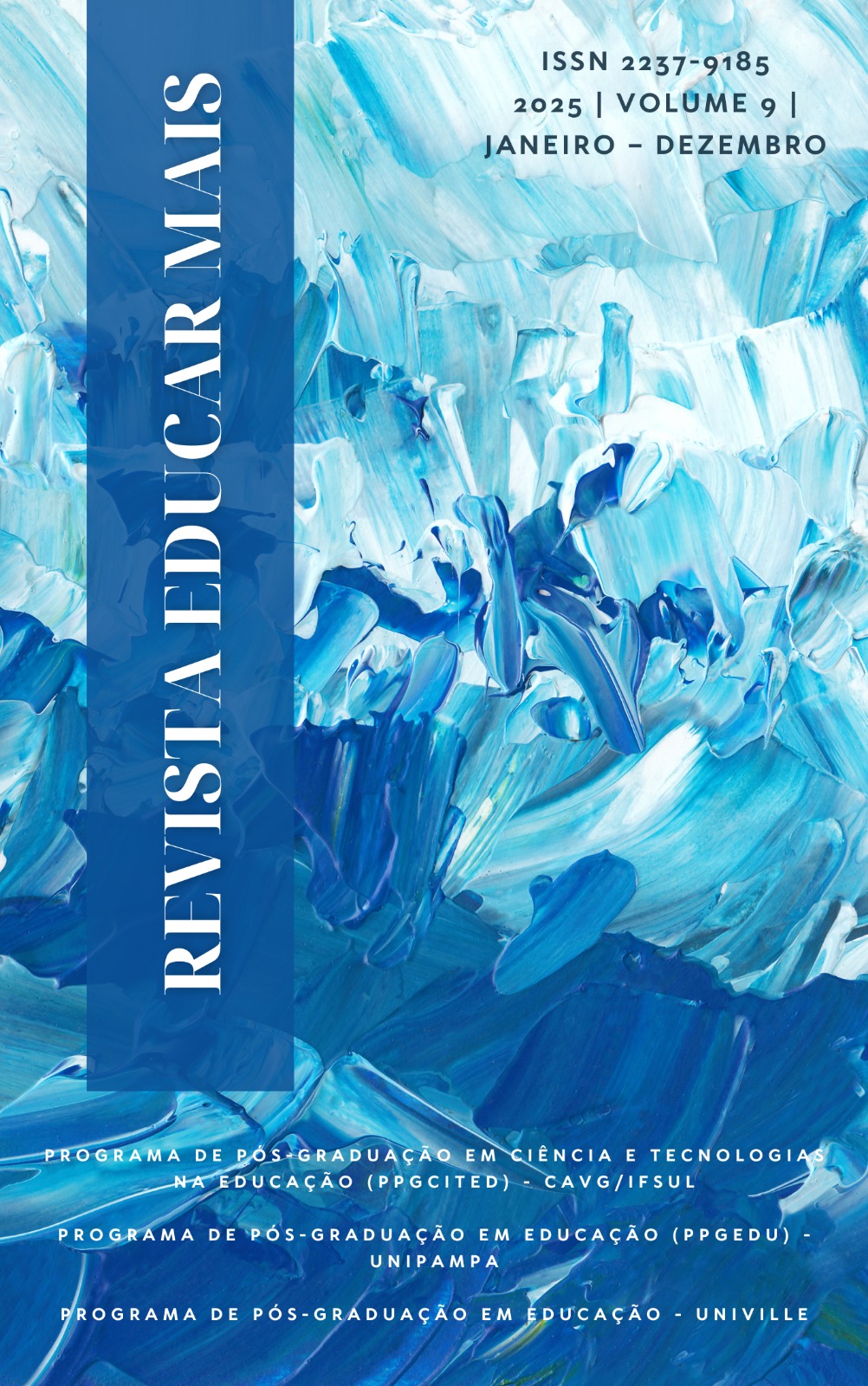Treading the path of Knowledge: the use of game-Based Learning for teaching DNA and RNA in the Final Years of Elementary School
DOI:
https://doi.org/10.15536/reducarmais.9.2025.4188Keywords:
Educational Games, Genetics Education, DNA, RNA, MethodologiesAbstract
This article aimed to develop and evaluate an educational game that promotes conceptual development about genetic material (DNA and RNA) for 9th-grade students in Elementary School. The central resource was the game “Genetic Trail of DNA and RNA”, developed as part of a methodological strategy to facilitate the learning of abstract and complex concepts. The theoretical framework is based on Vygotsky's Historical-Cultural Theory, which emphasizes the role of social and cultural interactions in the construction of knowledge, along with studies on active methodologies, focusing on the use of games as a pedagogical tool for complex scientific content. The qualitative methodology, based on Yin, involved observations and group discussions, which made it possible to identify the students' spontaneous knowledge. After a dialogic lecture, the students played the game. Data analysis showed that most students considered the game fun, interactive, and collaborative, increasing their interest in the activity. Furthermore, the game contributed to the progression from spontaneous to scientific concepts, such as the structure and function of DNA and RNA. Interaction during the game created a supportive environment, fostering cognitive development within the Zone of Proximal Development, as proposed by Vygotsky. The use of educational games in Science teaching – especially in genetics – proved to be a promising strategy to make lessons more dynamic and engaging, encouraging other educators to adopt active learning methodologies.
Downloads
References
BRANCO, P. V. C.; CASTRO, M. S.; SILVA, V. L. M. O desafio de ensinar e aprender genética em uma escola pública de ensino fundamental. Pesquisa em Foco, v. 24, n. 1, 2019. Disponível em: https://doi.org/10.18817/pef.v24i1.2031. Acesso em: 15 out. 2024.
LEWIN, B. GENES IX. 9. ed. Porto Alegre: Artmed, 2009. 893 p.
LOVATO, F. L.; LORETO, E. L. S.; SEPEL, L. M. N. Investigação criminal como contexto gerador para a aprendizagem de genética. Revista de Educação, Ciências e Matemática, v. 12, n. 1, 2022
MARQUES, N. L. R.; ROSA, C. T. W. Algumas implicações pedagógicas da Escola de Vigotski para o Ensino de Ciências. Obutchénie. Revista de Didática e Psicologia Pedagógica, v. 7, n. 2, p. 1-23, 2023. Disponível em: https://seer.ufu.br/index.php/Obutchenie/article/view/72097/37593. Acesso em: 15 out. 2023.
MOREIRA, M. A. Teorias da aprendizagem. 2. ed. São Paulo: Ed. E. P. U., 2015
SOUZA, V. L. T. de; ANDRADA, P. C. de. Contribuições de Vigotski para a compreensão do psiquismo. Estudos de Psicologia (Campinas), v. 30, n. 3, p. 327-337, set. 2013. DOI: 10.1590/S0103-166X2013000300005. Disponível em: https://www.scielo.br/j/estpsi/a/F937bxTgC9GgpBJ8QhCKs6F/. Acesso em: 15 out. 2023
VIGOTSKI, L. S. A construção do pensamento e da linguagem. São Paulo: Martins Fontes, 2001.
VIGOTSKI, L. S. Pensamento e linguagem. São Paulo: Martins Fontes, 1989.
WARSCHAUER, Cecília. Rodas em rede: oportunidades formativas na escola e fora dela. Rio de Janeiro: Paz e Terra. 2001.
WOSKI, S. A.; SCHMIDT, F. J. DNA e RNA: Composição e estrutura. In: Manual de bioquímica: com correlações clínicas. 1. ed. São Paulo: Editora Blucher, 2011. p. 29-30.
YIN, R. K. Pesquisa qualitativa do início ao fim. Porto Alegre, RS: Penso, 2016.
Downloads
Published
How to Cite
Issue
Section
License
Copyright (c) 2025 Amanda Machado Caetano, Maria Isabel Giusti Moreira

This work is licensed under a Creative Commons Attribution-NonCommercial 4.0 International License.
DECLARATION OF RESPONSIBILITY: I hereby certify that I partially or fully participated in the conception of the work, that I did not hide any links or financial agreements between the authors and companies that may be interested in this article publication. I certify that the text is original and that the work, partially or fully, or any other work with a substantially similar content written by me, was not sent to any other journal and it will not be send while my submission is being considered by Revista Educar Mais, whether in printed or electronic format.
The author responsible for the submission represents all the authors of the manuscript and, when sending the article to the journal, guarantees s/he has obtained the permission to do so, as well as s/he guarantees the article does not infringe upon anyone’s copyright nor violate any proprietary rights. The journal is not responsible for the opinions expressed.
Revista Educar Mais is Open Access, does not charge any fees, whether for submission or article processing. The journal adopts Budapest Open Access Initiative (BOAI)’s definition, i.e., any users are permitted to read, download, copy, distribute, print, search and link to the full texts of these articles.
All the articles are published under the Creative Commons Atribuição-NãoComercial 4.0 Internacional license. The authors keep the copyright of their production. That way, they must be contacted directly if there is any interest in commercial use of their work.
















